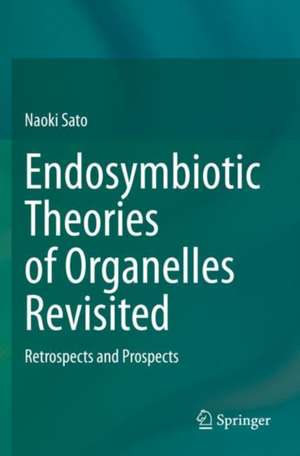Endosymbiotic Theories of Organelles Revisited: Retrospects and Prospects
Autor Naoki Satoen Limba Engleză Paperback – 29 ian 2021
| Toate formatele și edițiile | Preț | Express |
|---|---|---|
| Paperback (1) | 826.51 lei 38-44 zile | |
| Springer Nature Singapore – 29 ian 2021 | 826.51 lei 38-44 zile | |
| Hardback (1) | 1000.24 lei 3-5 săpt. | |
| Springer Nature Singapore – 29 ian 2020 | 1000.24 lei 3-5 săpt. |
Preț: 826.51 lei
Preț vechi: 1087.51 lei
-24% Nou
Puncte Express: 1240
Preț estimativ în valută:
158.15€ • 165.57$ • 130.86£
158.15€ • 165.57$ • 130.86£
Carte tipărită la comandă
Livrare economică 01-07 aprilie
Preluare comenzi: 021 569.72.76
Specificații
ISBN-13: 9789811511639
ISBN-10: 9811511632
Pagini: 187
Ilustrații: XII, 187 p. 48 illus., 10 illus. in color.
Dimensiuni: 155 x 235 mm
Greutate: 0 kg
Ediția:1st ed. 2019
Editura: Springer Nature Singapore
Colecția Springer
Locul publicării:Singapore, Singapore
ISBN-10: 9811511632
Pagini: 187
Ilustrații: XII, 187 p. 48 illus., 10 illus. in color.
Dimensiuni: 155 x 235 mm
Greutate: 0 kg
Ediția:1st ed. 2019
Editura: Springer Nature Singapore
Colecția Springer
Locul publicării:Singapore, Singapore
Cuprins
Chapter 1. Introduction.- Part I History of endosymbiotic discourses.- Chapter 2. Mereschkowsky, founder of endosymbiotic hypothesis.- Chapter 3. Endosymbiotic discourses until the mid 20th century.- Chapter 4. Re-evaluation of the initial ideas of Lynn Margulis.- Chapter 5. Endosymbiotic discourses in the 1960s and 1970s.- Part II Current perspectives.- Chapter 6. Phylogenetic evidence for the endosymbiotic origin of organelles.- Chapter 7. Continuity and discontinuity of chloroplasts and cyanobacteria.- Chapter 8. Re-examination of the "endosymbiotic event".- Chapter 9 Concluding remarks.
Notă biografică
The author is a Professor Emeritus of the University of Tokyo. He obtained his PhD on biosynthesis of lipids in cyanobacteria from the same university, and then worked in various areas of research on cyanobacteria and chloroplasts, including molecular biology of DNA- and RNA-binding proteins and DNA/RNA polymerases, as well as bioinformatic studies involving software development, comparative genomics, and phylogenetic analysis. He has also worked in the fields of history and philosophy of biology, especially the history of modern biology and basic theory of life.
Textul de pe ultima copertă
This book re-examines the endosymbiotic theory, and presents various related theories and hypotheses since the first proposal in 1905 by a Russian biologist. It also demonstrates that Lynn Margulis’s contribution to the current endosymbiotic is less than sometimes thought, and presents a plausible idea on how the organelles were formed. Explaining that Margulis’s initial work did not intend to show the endosymbiotic origin of chloroplasts and mitochondria, the book discusses their endosymbiotic origin in the light of current biology with the help of clear visual images. Further, by including numerous historical facts and details of phylogenetic analyses using recent genomic data that are largely unknown to many in the field, it offers deep insights into the history of biology, phylogenetic analysis, and the new evolutionary thinking. 2017 was the 50-year anniversary of Margulis’s first paper in the Journal of Theoretical Biology, and 2020 will mark 50 years since the publication her famous work Origin of Eukaryotic Cells, and as such this book offers a timely reconsideration ofthe works of Lynn Margulis and the endosymbiotic origin of organelles.
Caracteristici
Presents Margulis's original thoughts, which are not restricted to the endosymbiotic origin of mitochondria and chloroplasts
Offers a new meaning of endosymbiotic origin of organelles, reflecting post-genomic biology
Enables biology students to gain an understanding of the methods of phylogenetic analysis
Presents a comprehensive comparison of cyanobacteria and plastids for students of plant biology
Offers a new meaning of endosymbiotic origin of organelles, reflecting post-genomic biology
Enables biology students to gain an understanding of the methods of phylogenetic analysis
Presents a comprehensive comparison of cyanobacteria and plastids for students of plant biology
